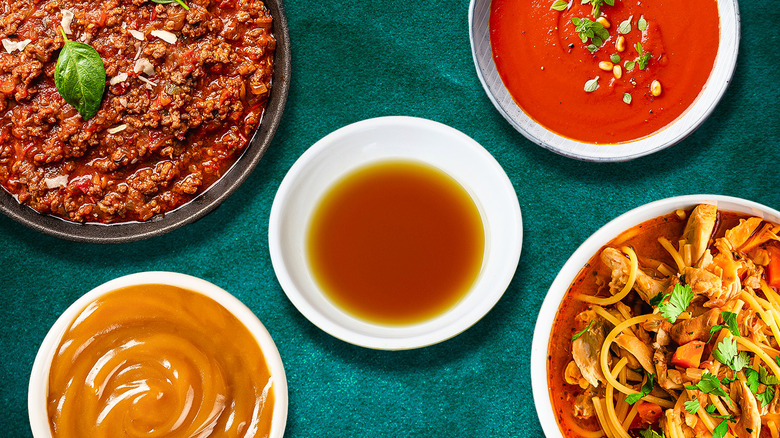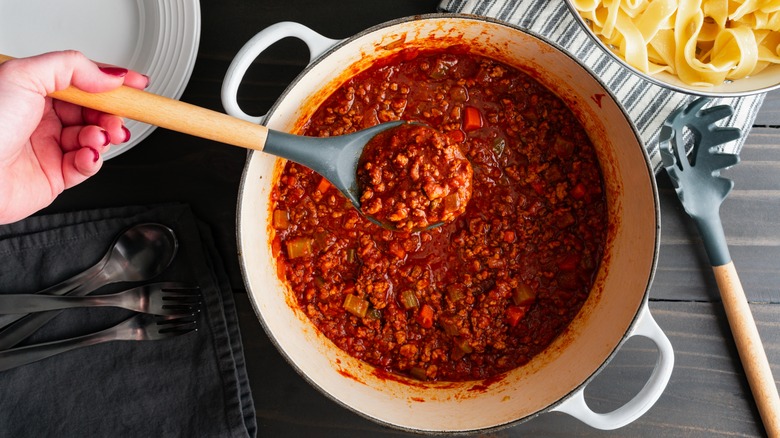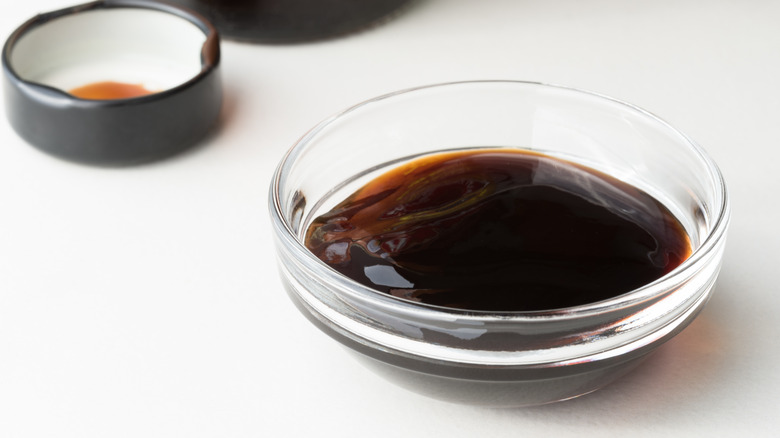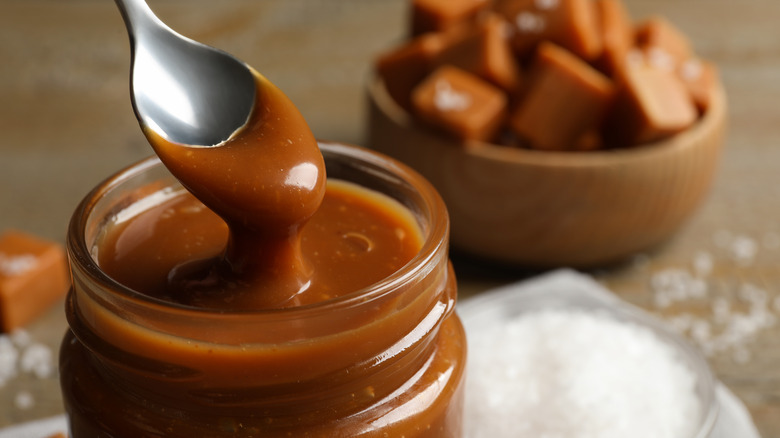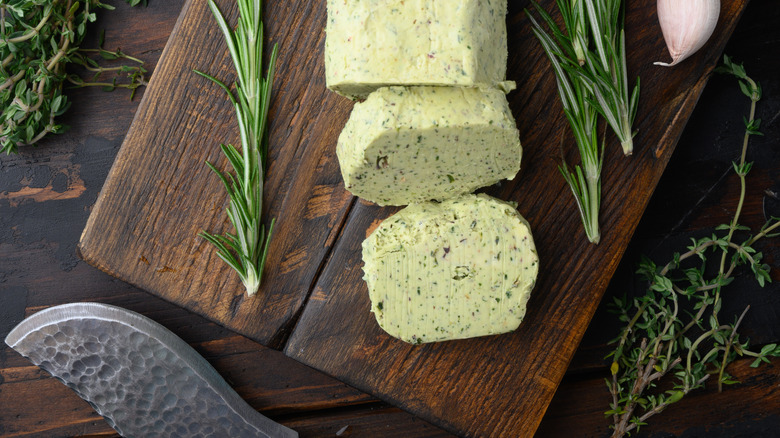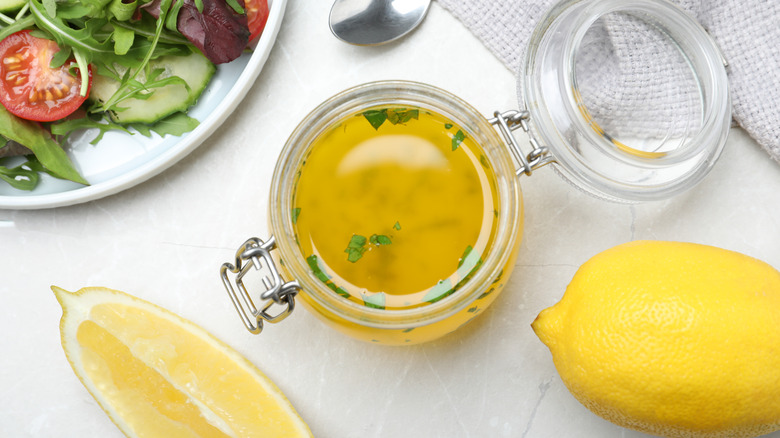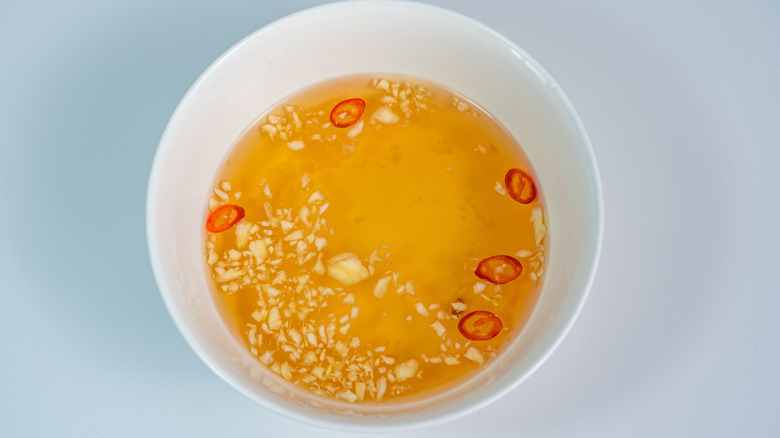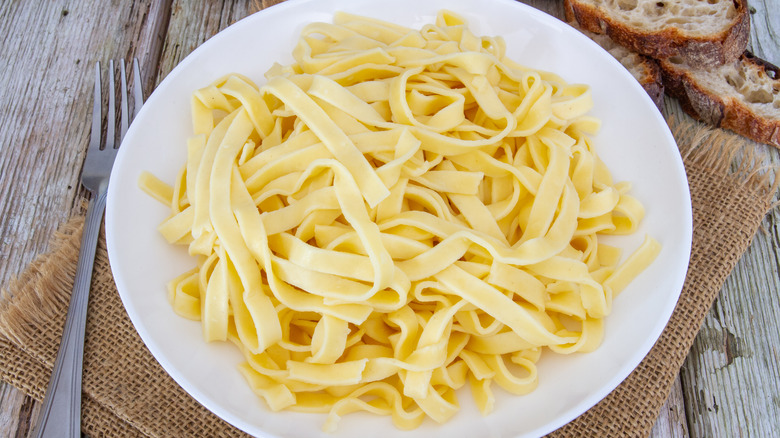16 Creative Ways To Use Fish Sauce
There is perhaps no ingredient that offers the punchy, salty, umami-rich, and deeply delicious flavor that fish sauce does. Although the condiment can trace its roots back to both China and Ancient Rome, it's now mostly produced across Southeast Asia, where it's made from fermented anchovies. And if you're looking for easy ways to balance and enhance your favorite dishes, you really need to make sure you have some fish sauce in your pantry at all times.
Whether you're a seasoned fish sauce user or you're wondering how to get started cooking with the ingredient for the first time, you're in luck. We spoke with a few fish sauce aficionados, including recipe developer Irena Macri of Cooked & Loved, chef and culinary advisor for Restaurantji Kevin Ashton, and owner of Kashkan restaurant Ranveer Brar, to learn how they use fish sauce in their own recipes. Check out these ideas to use this iconic condiment in traditional — and completely unexpected — ways.
Add fish sauce to your bolognese recipe
If you love making pasta, then you've probably made a bolognese sauce or two in your lifetime. But what if your bolognese was missing one essential ingredient that could take it to a whole new level? Enter fish sauce. According to Irena Macri, fish sauce can give a traditional bolognese sauce a powerful punch of flavor. "Most people think of fish sauce as something super salty and fishy," she explains, "But when used in small quantities, it can add that magic umami flavor to the dish. I always add it to my bolognese sauce."
You don't have to add a ton of fish sauce to your pasta sauce to make it more flavorful, though. One to two tablespoons will do the trick — but feel free to add more if you really want to capture that strong flavor. It complements the cooked tomatoes, which boast a similarly high level of umami. Once you try fish sauce in your bolognese, you'll never go back.
Use it as a replacement for oyster sauce
You know that feeling when you plan on making a recipe, thinking you have everything you need already in your fridge or pantry, only to realize that you're missing that one essential ingredient? It's happened to just about every home cook. You can always make a spontaneous trip to the grocery store, but it's usually easier, cheaper, and less time-consuming to use an ingredient you do have on hand as a replacement. And if the ingredient you're missing is oyster sauce and you happen to have fish sauce on hand, you're in luck.
Simply, fish sauce is an excellent replacement for oyster sauce, especially if you're following a recipe that contains a lot of other ingredients. Admittedly, oyster sauce contains sugar in addition to oysters, which gives it a sweeter flavor profile than purely salty fish sauce. But add in a bit of extra sugar to the dish, and you'll get roughly the same effect you get from oyster sauce.
Take your chicken noodle soup to a new level with fish sauce
Honestly, most savory dishes can benefit from the boost of flavor fish sauce can provide, but perhaps one of the best dishes to add it to is chicken noodle soup. This is a soup that already contains plenty of salty, savory elements: There's the chicken broth which, if done right, is rich in salty flavors, as well as the chicken itself and a variety of veggies like celery and carrot. Add some fish sauce to your chicken noodle soup, and it'll highlight those flavors even more while adding an umami note to the finished dish.
If this is the first time you're putting fish sauce in your chicken noodle soup, you'll want to start slow. Add a small amount, then taste the broth to see how you like it. If you want more salt or more of that signature savory flavor, add a bit more until the broth reaches the ideal amount for your taste. Your chicken noodle soup will never be the same again.
Give your meatballs and burgers an umami note
You may be worried that adding fish sauce to non-seafood dishes will give those dishes an especially fishy flavor, but that's really not the case. In fact, plenty of meat-based dishes taste amazing when they're complemented with a dash of fish sauce, and that's especially true for ground meat. Irena Macri suggests adding fish sauce to your meat for an interesting twist on your standard recipe.
"It adds those fabulous umami notes to beef burgers and meatballs, without you being able to taste the fish sauce itself," explains Macri. Since you're probably using plenty of other ingredients in your burger and meatball mixtures, you're not going to be able to pick out that distinct fish sauce flavor. But you'll still benefit from the added flavor in the mix. Give it a try the next time you really want to wow your friends and family at a barbecue or on spaghetti and meatball night.
Make a flavorful gazpacho
There are few dishes more light and refreshing in the summer months than gazpacho, a chilled soup that hails from Spain. It's made with fresh tomatoes, which give the soup its signature savory, umami quality. However, if you don't have access to beautifully ripe tomatoes — or you're just looking to add even more of a flavor kick to your soup — you may want to consider using fish sauce in your gazpacho.
Fish sauce can be intense when it's tasted on its own, which may make you pause before adding it to your chilled soup. In reality, though, once fish sauce is added to a dish, you usually don't taste much of that fishy flavor anyway. So don't worry — you're not going to be turning your basic gazpacho into a seafood dish. Instead, it just highlights the other savory ingredients in the dish and adds a lovely salty quality to the finished product.
Use it as a replacement for Worcestershire sauce
Worcestershire sauce is an essential ingredient in plenty of savory, intensely flavorful dishes, which makes it one of the best sauces to have stocked in your kitchen. But we all run out of products we use on a regular basis from time to time, and you may not always want to make a grocery store run just to pick up a single bottle of sauce. Wondering what to do when a recipe calls for Worcestershire sauce and you don't happen to have any on hand? No problem: Just use fish sauce as a replacement.
Like fish sauce, Worcestershire sauce is a fermented condiment that contains anchovies, so they have a similar flavor profile. Worcestershire sauce does boast a lot more ingredients than a typical fish sauce does, but at their core, they offer similar salty, umami qualities to a dish. Although the flavors may not be an exact match, they're similar enough that fish sauce can be used in most recipes that call for Worcestershire sauce without most eaters being able to tell a major difference.
Try fish sauce in a Bloody Mary mix
Some of the best cocktails out there aren't sweet or bitter — they're savory. And if you love savory cocktails, then Bloody Marys may just be one of your favorites. There are countless ways to make a good Bloody Mary mix, and adding fish sauce is perhaps one of the easiest ways to infuse your cocktail with as much of that complex, savory flavor as possible, according to Irena Macri.
"Another fun way to use fish sauce is to add it to your next Bloody Mary mix," she explains. "Similarly to clam juice, a little fish sauce will add saltiness and umami without overpowering the rest of the ingredients." You don't need to add a ton of fish sauce to your Bloody Mary recipe to draw out those beautiful umami flavors. Just a dash of sauce in a cocktail can make a big difference flavor-wise, turning your standard tomato juice-based cocktail into an unforgettable brunch experience.
Use fish sauce in a caramel recipe
When you think of fish sauce, you probably think of savory dishes, not sweet ones. But did you know that the umami flavors found in fish sauce actually make it perfect for pairing with sugary dishes? When you combine sweet and umami foods together, they complement each other, drawing out both flavors even more. That means your caramel will simply taste more caramel-y while offering a hint of rich, umami goodness that an average caramel recipe just can't achieve.
You can add fish sauce to your caramel in place of salt. Since fish sauce is so salty, you won't want to add salt from another source as well, or your caramel may be overpowered. When you just use a small amount, the fish sauce will complement those lovely caramel flavors well without adding a fishy note. You can then use this caramel in a variety of dessert recipes, or you can use it as a marinade for sweet and umami roasted veggies, tofu, or meat.
Make Vietnamese-style pork ribs
When you want to turn a basic cut of meat into something really special, a delicious marinade is key. Luckily, fish sauce is an ingredient that can seriously take your marinade to the next level, according to Ranveer Brar. "My version of Vietnamese-style pork ribs [is] cooked with caramel," he explains. "I substitute soy sauce for the marinade which includes fish sauce, providing umami flavor depth and complementing caramelized sugar's sweetness."
In this case, fish sauce is playing an important role in the overall flavor of the fish. "Fish sauce does not just act as a condiment; it is the key ingredient in developing a complex and savory profile of these ordinary pork ribs," explains Brar. "What makes the difference is marinating overnight to allow the flavors to blend before slow roasting or grilling them perfectly." Whether you're making Vietnamese-style pork ribs or you just want to add flavor to any basic marinade, fish sauce is an excellent ingredient to have on hand.
Make your own umami butter
Butter can make just about any dish better, but butter is at its best when it's combined with other flavors. If you're looking for a way to upgrade an otherwise standard stick of butter, consider adding some fish sauce to the mix, says Irena Macri. Fish sauce, she explains, can create an incredible umami butter that you'll want to spread on just about everything.
"Take a bunch of softened butter, add a little fish sauce, soy sauce, minced garlic, and maybe some Worcestershire sauce, and whip everything into the most delicious butter," she suggests. Of course, you can play with the ingredients here if you want to, omitting the Worcestershire sauce or perhaps adding chilies for some heat. Regardless of the other ingredients you add to your butter, though, the results are bound to be deeply flavorful. "Use it on steak, fish, baked potatoes, cooked vegetables, or spread on sourdough with some fresh radishes on top," Macri suggests.
Add it to a simple vinaigrette
You can always buy store-bought salad dressing when you're searching for a way to make your salads more interesting, but if you want the best results, you should probably make your own vinaigrette from scratch. If you've never done it before, it might sound like an intimidating process, but you really just have to get a sense for the flavors that work well together. Fortunately, pretty much any vinaigrette could benefit from a splash of flavorful fish sauce.
You'll want to start slow, as the flavor of fish sauce can potentially overpower the other ingredients in your vinaigrette if you use too much. Add some to the mixture slowly, tasting as you go. Fish sauce pairs well with a wide variety of other vinaigrette ingredients, so feel free to experiment with olive oil, lemons, soy sauce, Worcestershire sauce, vinegar, herbs, garlic, and whatever else you think will really bring your salad together. One thing is for sure: Once you've experienced a homemade, fish-sauce spiked vinaigrette, you'll never want to go back to your plain bottled salad dressing again.
Stir some fish sauce into your stew
When the cooler fall and winter months finally arrive, you may want to retire your light, fresh salads in favor of something heartier and more substantial, and stew almost always fits the bill. Stews are a great dinner option because they allow you to use up all those extra vegetables you have sitting in the back of your fridge before they go bad. But you're going to need more than a pot full of veggies and protein to make your stew as flavorful as possible. Enter fish sauce.
With just a few tablespoons, fish sauce can transform your stew. Since it has such a bright, salty flavor profile, it can cut through those heavier, fattier flavors that can otherwise overwhelm your palate. It also adds another layer of umami flavor, which is echoed by the juices released from cooking meat. Add fish sauce to the pot with your other ingredients so it has time to mix and mingle with all the other flavors as the stew simmers.
Make the best French onion soup you've ever had
French onion soup may not be the easiest dish to cook, but once you master it, it's a soup you'll want to make again and again. It's a perfect first course for a dinner party at home, or you can simply make it as a way to brighten an otherwise boring weekday. Of course, following a traditional recipe will likely yield delicious results, but if you want even more rich, complex, and decadent results, add fish sauce to your French onion soup.
This is a soup that's already famed for its savoriness, with the onions contributing both sweet and umami notes. Adding fish sauce into the mix only heightens that savoriness, giving you an extra dash of salt with some extra complexity, and it really ties everything together. When paired with the meaty broth and gooey cheese on top, fish sauce acts as a complement and a contrast to the other flavors you're working with. Tradition is great and all, but an unconventional dash of fish sauce can make your French onion soup truly stand out.
Mix up Vietnamese nước chấm
Perhaps one of the best-known uses of fish sauce is to make a Vietnamese dipping sauce, and Kevin Ashton says it's one of the best ways to utilize the condiment. "One of my favorite ways to use fish sauce is in a classic Vietnamese dipping sauce called [nước chấm]. The recipe involves combining fish sauce with lime juice, water, sugar, finely chopped chili, and minced garlic," he explains. When all of these ingredients come together, they create an intensely savory sauce that can be used for a variety of purposes.
"The sauce delivers a perfect balance of sweet, salty, spicy, and tangy flavors," says Ashton. "The dipping sauce is an excellent accompaniment for grilled meats, salads, and spring rolls. The depth and complexity of [nước chấm] can transform a wide range of dishes." You can make a single serving size of this iconic Vietnamese sauce, or make a big batch and keep it in your fridge so you can use it over the course of a few days.
Add fish sauce to a basil beef dish
Basil beef is one of the most flavorful beef-based dishes you can make, and there are a lot of condiments and sauces to thank for that deeply savory flavor. Many basil beef recipes call for ingredients like oyster sauce, soy sauce, and hoisin sauce in addition to an array of spices and other flavorful ingredients. But if you want to pack an even stronger punch of flavor to the dish, there's perhaps no better sauce to add than fish sauce. When you drizzle some fish sauce into your basil beef, you'll get a stronger, more intense umami flavor that makes every bite that much more enjoyable.
Keep in mind, though, that since you're working with a lot of other salty ingredients in a basil beef dish, you'll really want to be careful about how much fish sauce you add. If you prefer a stronger fish sauce flavor, maybe pull back on the salt and other very salty ingredients. Most importantly, make sure you taste as you go to ensure you're capturing the perfect flavor profile.
Cook umami buttered noodles
When you're feeling sick or lazy or you just don't have anything in the pantry, buttered noodles are an ideal go-to dish. They're quick, they're easy, and they don't require much prep work at all. Best of all, they're incredibly comforting, offering a perfect combo of carbs and fat that'll keep you full and satisfied until your next meal. But unfortunately, sometimes, buttered noodles can just feel boring. The dish doesn't boast many interesting flavors, so you may be left wishing you could add something with a punch of flavor. That's where fish sauce comes in.
Fish sauce can create the umami buttered noodles of your dreams. Just a splash of it brings a brightness and a savoriness to the dish you can't achieve with a sprinkling of salt and pepper. Add some fish sauce to your melted butter before you throw in the pasta, and you'll have an incredibly flavorful bowl of buttered noodles for basically no extra effort.
